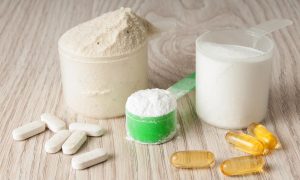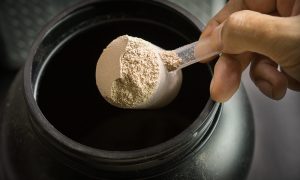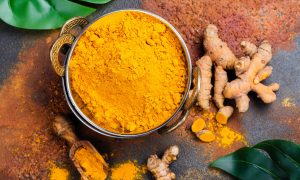Soy Protein Powder: An Essential Guide

|
|
Protein powder supplements are very much a part of everyday health and fitness these days, with whey protein currently the most popular health and sports supplement in the entire world. Every year, whey protein powder sales alone generate billions in profit for various supplement companies and manufacturers all over the globe. The benefits of whey protein for health and fitness purposes are seemingly never ending and are about so much more than just helping to promote muscle size and strength. But what about those of us that can’t consume whey protein for various reasons? Some people can’t consume dairy produce for dietary reasons such as food allergies and intolerances, whereas others may not consume dairy for ethical reasons such as veganism. In these instances, an alternative protein powder supplement is often sought after, with soy protein the protein of choice. However, some people’s opinions of soy protein are mixed, as some believe it can have negative, and potentially negative, side effects. Here we’ll be taking a look at soy protein powder in a bid to discover as much about this popular vegan/vegetarian-friendly whey protein alternative as we possibly can.
What is soy protein powder?
Soy protein powder is derived from natural soy beans that are naturally high in vegetarian-friendly protein. For vegans and vegetarians, soy protein powder is the protein of choice. Soybeans are actually a form of pea as they come from the same family and are most commonly found in Asia, particularly South East Asia in which there is an abundance of them. Soy protein is rich in amino acids, isoflavones, as well as dietary fiber as well. There are many health benefits associated with soy protein, and not just for bodybuilding and muscle building purposes either. Soy protein for example, also provides the body with lecithin, which is a vital nutrient with many health benefits. Soy has been consumed for over 5000 years now, and it is considered a great source of protein and is the best-selling alternative to animal-derived protein sources and supplements.
What are the main benefits of soy protein?

As mentioned, there are many benefits associated with soy protein, with some of the most common and prevalent examples including the following:
Heart health benefits – Our heart is one of our most vital organs and numerous studies rave revealed that high levels of LDL (Low Density Lipoprotein) cholesterol in the body, can contribute towards heart disease and heart attacks. LDL cholesterol can form fatty deposits and build-ups in the arteries and blood vessels. Overtime this can reduce circulation, increase blood pressure, cause blood clots, and even harden and form plaque deposits that can then lead to heart attacks. Experts have found that soy protein is a fantastic food and supplement source when it comes to reducing harmful LDL cholesterol levels. The soy protein and isoflavones found in soy protein powders for example, would lower LDL cholesterol by as much as 10%. They also improve heart health as they can dilate our coronary arteries which improves blood flow, circulation, oxygen, and nutrient delivery.
Weight loss benefits – Soy protein powders are considered a great source of protein when it comes to weight loss for various reasons. Protein is thermogenic, and so it naturally burns more calories whilst it digests anyways, no matter which source it is derived from. The main reason why soy protein powders are considered far more beneficial than whey protein powders when it comes to weight loss however, is that many whey protein powders contain large quantities of sugars, sweeteners, and other artificial ingredients that can hinder weight loss. Soy protein powders often contain natural flavourings as well as minerals and vitamins and so CAN provide weight loss benefits.
Muscle building – Protein is a vital macronutrient when it comes to building muscle but unfortunately most protein sources come from animals and animal by-products. Meat, seafood, fish, eggs, and dairy are the primary examples, and all of them are animals and/or animal by-products. If you’re a vegan or vegetarian however, you may be struggling to get enough protein. In this instance, soy protein powder is ideal for vegan and vegetarian bodybuilders and can help them to easily meet their daily macros each day.
What about the potential dangers

Though beneficial in numerous ways, some experts believe that soy protein can actually be harmful and detrimental to our health and well-being for a number of various reasons. These include:
Possible cancer risks – Although very beneficial, isoflavones found in soy protein powders in large quantities COULD potentially cause possible cancer risks. These isoflavones are estrogen-like compounds and so mimic the effects of the hormone estrogen. In small quantities, these isoflavones could help to reduce the likelihood of breast cancer, whereas large quantities COULD contribute towards various forms of other cancer, including breast cancer, particularly in breast cancer survivors, if consumed over a prolonged period of time.
Weight gain – Although this may contradict the previous benefit listed above talking about how soy protein can promote weight loss, studies have revealed that consumed in too large a quantity, soy protein could actually lead to weight gain and suppressed metabolism which could make weight loss far harder in the future. This is again all down to those pesky isoflavones and their estrogren mimicking components. Estrogen suppresses metabolism and contributes towards fat gain, almost making it the anti-testosterone hormone of the body. Simply put, if we have too much estrogen and estrogen-like compounds in our bodies, our metabolisms will decrease and we will struggle to lose weight. What’s more is the fact that we’ll gain fat more easily. To make matters worse, soy protein has a large concentration of goitrogens, which have been found to block the natural production of various thyroid producing hormones. Underactive thyroid glands can again lead to suppressed metabolism, so be wary of consuming too much soy protein.
Soy or whey: which is better?

In truth it all depends on your health and fitness goals, as well as your own personal circumstances and beliefs. If you eat meat, can consume dairy, enjoy consuming meat, eggs, and dairy etc, and are looking to build muscle and improve your physique, whey protein powder is probably your better choice. For vegans and vegetarians however, soy protein is still very useful and very beneficial, and providing you don’t go crazy and consume it as your primary protein source, you will still see many benefits and very few, if any, negative side effects.












